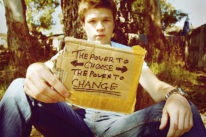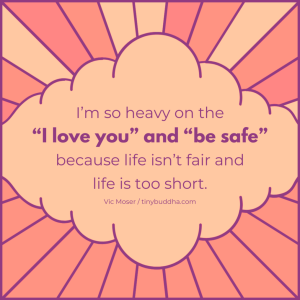
“An outstanding love doesn’t come from two half-fulfilled people coming together to make one whole, complete life. Outstanding love comes from two whole people coming together to share and enhance their already full and beautiful lives.” ~Pia Scade
My partner and I were having a conversation about our relationship recently.
We both told each other just how much we loved the relationship. We weren’t talking about how much we love each other, but about how much we enjoy this shared space between us, this thing we call our relationship.
We enjoy giving to it and nurturing it. We enjoy receiving from it. It challenges us on a regular basis, but ultimately those challenges make us better people.
We feel that the relationship enhances us as individuals and makes us happy. We don’t need it, we don’t depend on it, but we sure do want to keep it.
It wasn’t always like this for me. With past girlfriends things always started out well, but over time my insecurities would take over.
I would lose my sense of self and become absorbed into the relationship. I would come to depend on the partnership for satisfaction, happiness, validation, and self-worth. My other half was often equally struggling.
The result was that the positive energy in the space between us got drained. The more needy we both became the more toxic it got.
We clung on because we thought we needed each other but we became resentful and started to hate the relationship. Neither of us was doing anything to nurture our love. We hung on until it got so bad that somebody snapped, and then it ended.
The difference between then and now is self-love. In the past I was insecure and needy, and I didn’t yet know who I was or what I wanted from life and from love. My partners had similar problems and inevitably my relationships would eventually turn sour.
Now, after a lot of personal growth and self-actualization, with a partner who has also done the same, I can genuinely say that I love myself and I am glad to be me.
Self-love means now that I also love my relationship. I don’t depend on it, as I did in the past, and it doesn’t take away my individuality. It enhances me.
It seems like such a simple concept but it was a big epiphany when we both came to realize it in our recent conversation.
We love ourselves, we love each other, but long after the rose tinted glasses have come off, we love this thing called “us.” As partners, teammates, friends, and lovers we think the space between us is awesome.
Learning Self-love While In A Relationship
It can be difficult to be in a relationship if you don’t have a great deal of self-love. Often the insecurities will lead to conflict, and sometimes the conflict will lead to a breakup.
A common piece of advice is that you have to learn to love yourself before you even get into a relationship.
But what if you are already with someone? Does it mean you have to part in order to do the work on yourself before finding love again? Do you have to meet some arbitrary self-love prerequisite before you qualify for a relationship?
Of course it helps to be entering a relationship with a strong feeling of self-love. But I also think that if you are in a partnership where self-love is lacking, and the space between you is needy, irritating, and harmful, things can be turned around.
Learning self-love is an ongoing process. It’s not a switch you can just flick on. Even couples who have a healthy amount of self-love could have more.
How To Develop Self-Love If You Are In A Relationship
1. Maintain a degree of space and independence.
It’s unhealthy to allow the relationship to absorb your identity and to lose yourself as a person. Keep your own rituals, your own activities, and your own friends. Spend a healthy time apart doing your own thing to nurture your soul.
2. Remember you are the master of your own happiness.
Your partner can’t make you happy. Only you can do that. He or she can enhance the happiness that you nurture in yourself, but it is not their responsibility to make you happy. If you rely on them for happiness you will drain the space between you. Make sure you take the responsibility yourself.
This isn’t an easy thing to do and is a habit that you need to develop over time. It starts with adopting a mindset that happiness is a choice, meaning you give yourself the power to cultivate happiness for yourself. It’s difficult and it’s hard work, but it’s liberating because you refuse to allow your happiness to be dictated by your circumstances or by other people.
Choosing happiness means accepting the truism that the only person you can change is you. Instead of looking to change others, you work on yourself and make sure you meet your own needs.
Another way to take responsibility for your own happiness is to choose to be present. If you wait for the perfect conditions before you allow yourself to be happy, then you will always be waiting.
Instead of saying, “I’ll be happy when…” you choose happiness now. You quiet thoughts of the past or the future and decide to be happy in the moment.
Doing the little things that make you happy helps with this. Embrace the small daily moments you have to nurture yourself, like sitting down with a cup of tea or taking ten minutes to meditate. This can help quiet your mind, allowing you be present and to find a moment of joy in your day.
Working through your baggage from the past can also help you feel lighter and more present and makes it easier to choose happiness. Yet working through past pain is an ongoing process, and while it’s good to do it, it doesn’t have to hold you back from choosing happiness.
It doesn’t have to be, “I’ll be happy once I overcome my baggage.” You can be happy right now.
3. See in yourself what your partner sees in you.
Insecure people struggle to see anything good in themselves and are often dismissive of the positive things their partner sees.
Ask you partner what they see in you and what it is about you that they love. This is a great date night exercise for couples. Write a list of twenty things you love about each other and take turns reading them out.
If you do this regularly you will slowly take it onboard and internalize it and start to believe it about yourself.
For example, I used to be critical of myself for being too reserved and boring. But I’ve come to realize that my partner really appreciates my ability to keep an even keel when in rough emotional waters.
My highs aren’t that high but my lows aren’t that low. Instead of seeing this as me being boring and something to be critical of, I now see it as a sign of strength and something valuable that I bring to the relationship.
In a relationship you aren’t just learning about the other person, you are also learning about yourself.
4. Don’t get disheartened when you see your flaws.
On the other hand a relationship will also hold up a mirror to your flaws. Things you have learned to live with about yourself may irritate your partner.
We all have our flaws. Some things can be ignored; others might be something you want to work on. Either way, don’t let it get you down or get in the way of self-love.
Exposing flaws is a natural part of a relationship; it doesn’t mean you are a terrible person or that you are unlovable.
5. Forgive yourself for your failings.
Holding a grudge against yourself gets in the way of self-love. It’s inevitable in a relationship that there will be times you say or do things that you regret. Don’t beat yourself up about it.
6. Remember love is an action, not a feeling.
Wise minds have always maintained that love is something you choose to do, not an emotion that you feel. This is often said about loving another but the same is true about loving yourself.
Even if you don’t feel like you love yourself, choose to act in a self-loving way. Make time to nurture yourself and fulfill your own needs.
The best way to do this is to schedule “me time” everyday. This is a period where you put yourself first over any other commitments or other people. Do simple activities that you enjoy. For me it’s going to the gym, reading the news, and eating a quiet breakfast. Some like to meditate, do yoga, or read.
It’s all about creating a little self-love ritual. One session might not make a big difference, but if you can make it a regular daily habit then the cumulative benefits will add up.
I’ve been won over by the early riser brigade that the morning is the best time to schedule this, as there are no other distractions. Every day for the last year I have woken up an hour earlier than normal so that I have my daily self-love time. You may prefer to do it in the evening as a wind down before bed, but either way, make it a priority.
—
Remember that self-love is important for enjoying a happy, healthy, and respectful relationship. When you are secure, confident, and feeling good about yourself you feed positive energy into the space between you.
If you are feel that you are struggling in your relationship, focus on yourself, work on self-love, and you will see things improve.
Happy couple image via Shutterstock
About Brad Alexander
Brad writes about helping young men navigate the often murky transition from boyhood to manhood. His website Badass Young Men deals with all the challenges young men face such as jealousy and insecurity, relationships, fitness and career.













 Though I run this site, it is not mine. It's ours. It's not about me. It's about us. Your stories and your wisdom are just as meaningful as mine.
Though I run this site, it is not mine. It's ours. It's not about me. It's about us. Your stories and your wisdom are just as meaningful as mine.